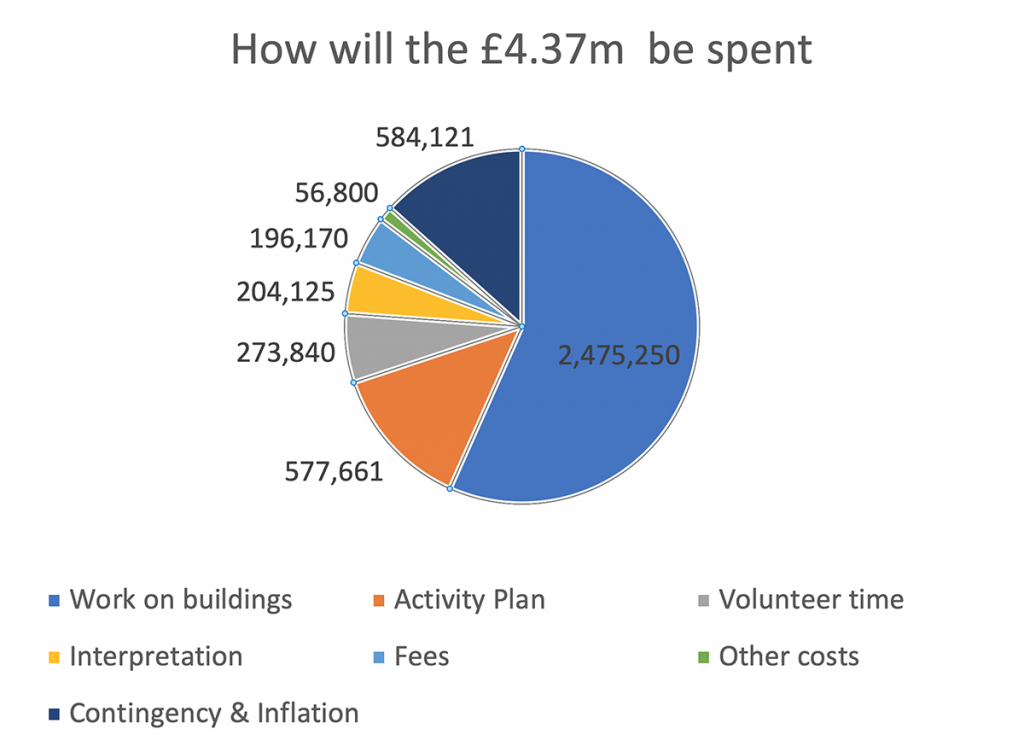FAQ
1). How much will the project cost?
The development phase is costing £203k and this is covers the detailed design work, various surveys and the development of the Round 2 application to the NLHF. The delivery phase will be £4.37m and the breakdown is given below:

2) How is it funded?
The project funders for the delivery phase are as follows:
National Lottery Heritage Fund
The Ffestiniog and Welsh Highland Railway Trust
Ffestiniog Railway Society
3) How long will the project last?
The delivery phase is expected to last three years so completing in 2024 but this is still under consideration as we work out what can be done and when as part of our development work.
4) Is the project focused solely on Boston Lodge Works?
No, this is the Interpretation and Boston Lodge Project.
The project aims to enhance interpretation across both railways and at key stations by developing our story telling (already a great asset), new signage at key stations, developing the website and providing an app to help point out key features. We want visitors to learn a little extra at every touch point and be keen to come back to find out more. If the nomination for World Heritage Status for the Slate industry is successful then the railway is likely to be the gateway for visitors and our interpretation should help foster understanding of the uniqueness of the area and pride in its industrial heritage of which the railway is a living part.
The work at Boston Lodge does include work on several of buildings which will make the site work better and provide more space for volunteer projects. A key part of encouraging deeper engagement with the railway will be the Guided Tours of Boston Lodge – we know that people want to see behind the scenes and that this can also be a good way to get people more involved and potentially volunteering for the railway.
Underpinning all this will be a detailed Activity Plan which summarises how we will develop skills through a wide range of traineeships, work placements, skills workshops as well as undertake volunteer projects in interpretation and engineering and developing the guided tours for Boston Lodge.
5) Is it about more than just trains?
Yes, this is about the wider railway and interdependence with the slate industry as well as encouraging our visitors to experience the dramatic natural beauty of Snowdonia It is about developing skills from engineering (ok that’s about trains) to story telling (which can be anything from trains to the recipe for welsh cakes or where the best place to see the Ospreys is).
6) Will it tell the story of normal local people involved with the railway?
Yes. Stories about people involved at all levels will be an important part of the interpretation. We are very aware of the deep local family ties to the historic railway and the slate industry and the rich variety of volunteers there have been and are and we want to tell these stories as well as stories about the development and restoration of the railway. There is a specific volunteer project to collate and record memories of volunteers and local residents to contribute to interpretation.
7) Will there be tours during the building work at Boston Lodge?
Yes. These will be a great opportunity, for the local community particularly, to see what is happening and to see traditional skills being used.
8) Will all staff members and volunteers have a part to play in this project?
Whilst some staff and volunteers will be more involved than others, over the course of the project all involved with the railway, whether staff, volunteers, society members or supporters will have a part to play in developing and sustaining the project. There are many different aspects to this project which require a large array of skills and expertise. This website is dedicated to the NLHF project and will include all updates and relevant contact details for the project.
In the delivery phase this website will be a key way we communicate with staff and volunteers and highlight opportunities for involvement which could include:
• Helping to support trainees in project management, operations and interpretation
• Helping to support work placements
• Developing interpretation including content for guided tour
• Researching and digitising archives
• Involvement in a range of engineering and building projects
• Skills development to become volunteer leaders
• Developing story telling skills
• Training to become a guide
• Supporting events and workshops
